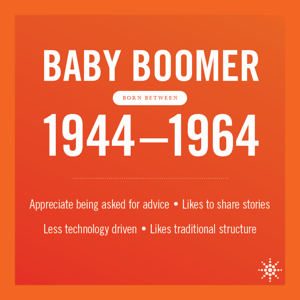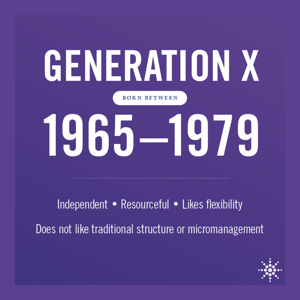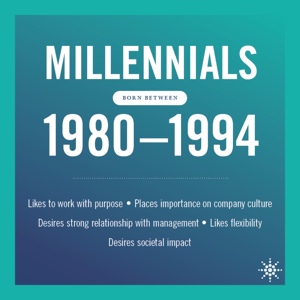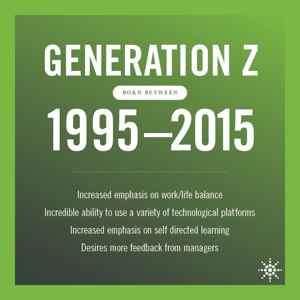
Today’s workforce is more generationally diverse than ever. Many companies find themselves employing workers within four different generations, which results in new challenges for employers and managers. One of those challenges is delivering effective employee recognition.
According to Gallup, recognition is the greatest missed opportunity for managers and your bottom line. Employee recognition increases employee engagement, which also increases productivity and retention. So, where do you start?
First of all, don’t bury your head in the sand. You can’t ignore generational differences. With years of experience, Baby Boomers are remaining in the workforce longer while Generation Z is adding their “constantly connected” traits into the workforce at the same time. Having a broad range of experience and ideas from multiple generations brings new ideas and innovation to the table!
To help you successfully recognize and engage an age-diverse workforce, let’s look at four different generations and identify some unique traits, needs, and contributions each group brings to the workplace. This will provide great insight at a high level, but remember, the most effective recognition is personalized and meaningful. This will give you a pulse on trends but uncovering how each person feels valued is the key to effective recognition. Let's get started at the top!
Recognition Strategies for Each Generation!

Baby Boomers were born between 1944 and 1964. While many baby boomers have already reached (or are soon to reach) the average retirement age, many are choosing to remain in the workforce. Baby Boomers are known for having a strong work ethic. They were raised in an age that valued professional accomplishments and achieving goals, as opposed to a work/life balance, resulting in a competitive drive. For obvious reasons, Baby Boomers have spent most of the career without the technology so many of us take for granted. They know how frustrating it can be when the keys get stuck on a typewriter! This generation tends to value one-on-one communication vs. the more impersonal email and instant messaging approach. Even though many came of age in the dawn of the hippies and rise of Disco, Baby Boomers appreciate the more old-fashioned approach to business.
- If you have a boomer on your team, it’s best to deliver any recognition in person and tie the recognition to their achievements, professional goals, and career path.
- Deliver the recognition in a one-to-one setting and ensure it’s from a direct supervisor or higher-up.

Generation X was born between 1965 and 1980. For a long time, Generation X was considered an enigma. While they still had the drive to excel professionally, they did not desire to do so at the expense of a work/life balance. Generation X values the ability to work independently and shuns micro-management in the workplace. When it comes to technology, Generation X is often in a grey area – while they are not as tech-savvy as younger generations, they have adapted quite well to today’s technological workplace.
- If you have a GenXer on your team, it’s best to deliver recognition in-person with a direct supervisor or higher-up.
- Tie any recognition to their professional skills and experience and show how they will help lead the company into the future.
- GenXers are on the cusp of executive leadership and appreciate being valued as such.

Millennials were born between 1981 and 1996, Millennials are now the largest group in the workforce worldwide. In a recent report by Inc.com Millennials make up nearly 50% of the global workforce and are expected to make up nearly 75% by 2025! This is the “start-up” generation. This generation aims to work smarter, not harder and values the ability to work in a flexible, less formal environment. Millennials value a work/life balance and the ability to be independent and think for themselves. They are the first generation to be highly engaged in technology and can quickly adapt to new technological advances easier than previous generations. They value their opinions being listened to and receiving feedback from their managers on a regular basis. Millennials are more likely to change jobs several times.
- If you have a Millennial on your team, it’s important to deliver recognition and feedback on a consistent basis.
- Recognition and feedback should be given by a direct supervisor throughout a project, which usually can be accomplished via less formal communication channels, followed by an in-person one-on-one meeting with the higher-ups upon the successful conclusion of a project or event.
- Ask for their opinions on what worked and what could be changed in the future!

Generation Z was Born between 1997 and 2015, they are the youngest generation in the workforce. Technology is essential in their personal and professional lives. This is the first generation to grow up in a completely wireless world. As a result, Generation Z prefers to use advanced technology in the workplace to increase flexibility and self-reliance. This is the tele-commute generation. They want flexibility and desire to express their creativity in the workplace and feel valued when their unconventional approaches to a project are listened to and implemented. Because of their experience with technology, Generation Z is composed of excellent multi-taskers who are easily distracted. They value work with many short-term projects at one time and desire immediate feedback from their managers.
- If you have GenZ on your team, mentor and show interest in their professional development.
- Peer to peer recognition via digital platforms should be considered and encouraged.
- GenZers value teamwork and social interaction, they desire to receive accolades not only from management, but from their peers as well.
- Instant and earnest recognition is important and today’s ever advancing social platforms are the perfect way to do so.
Peel Back the Layers
Now that we understand how each generation ticks, don't stop here!
Generational trends influence recognition preferences and expectations, but each of your employees is uniquely different as a whole person. Unfortunately, many managers and employers make the mistake of making age-based assumptions about how their employees want to be recognized and not getting to know the human behind the label.
Consider an orange:
-3.png?width=300&name=How%20to%20Successfully%20Engage%20and%20Retain%20a%20Generationally%20Diverse%20Workforce%20(Blog%20Post)-3.png)
The outer layer is the generational label and this is what we may see first. However, you have to peel back that layer before you really get to know the individual slices inside that orange.
So, pull back the peel and start asking the right questions! Find out how they like to be recognized and what rewards or perks would mean the most. Get to know each employee as an individual and uncover how they uniquely feel valued. After all, lack of appreciation is one of the top reasons why people quit or aren’t engaged.
With this information, you can deliver meaningful recognition the Sparck way - at the right time, in the right way, with the right reward.
